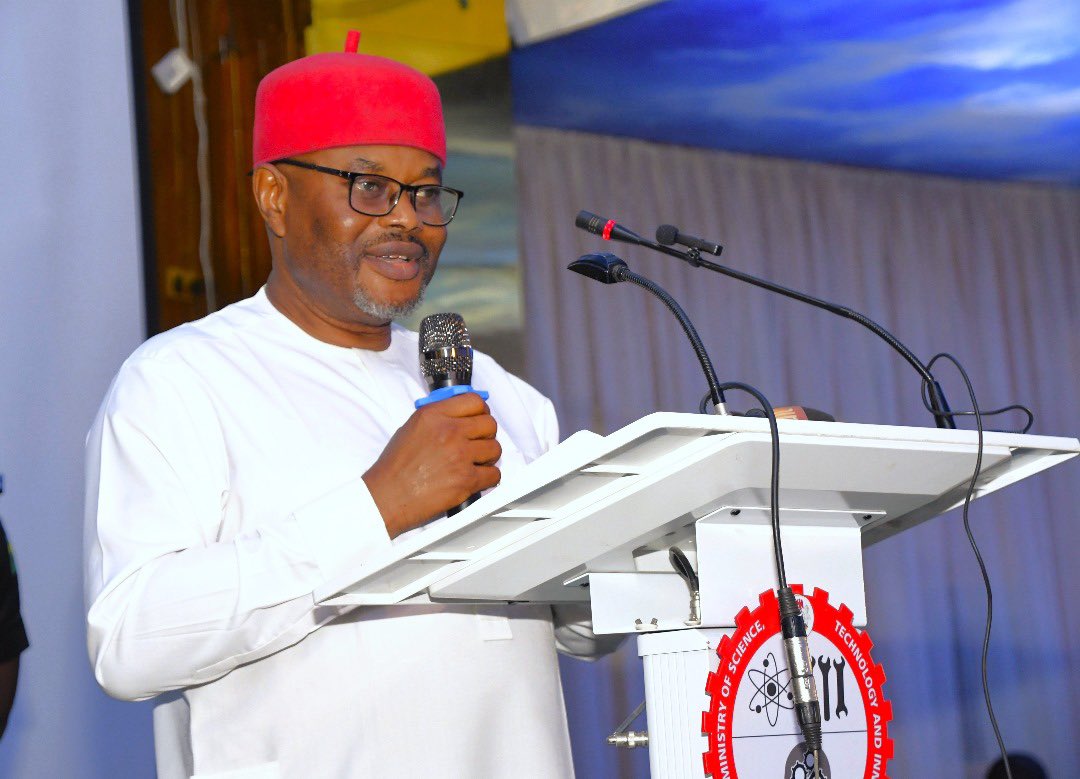
The University of Nigeria, Nsukka (UNN), has disowned the Bachelor of Science degree certificate being paraded by Uche Nnaji, Nigeria’s Minister of Science, Technology, and Innovation, describing it as fake and not issued by the institution.
The revelation, contained in an official letter signed by the university’s Vice-Chancellor, Professor Simon U. Ortuanya, has intensified controversy surrounding the minister’s academic and service records. The statement, issued in response to a Freedom of Information (FOI) request by Premium Times, categorically stated that Mr. Nnaji never graduated from the institution and was therefore not eligible to possess a valid degree certificate from the university.
According to the Vice-Chancellor, records available at UNN confirm that Nnaji was indeed admitted into the university in 1981 with Matriculation Number 1981/30725. However, he did not complete his course of study or meet the graduation requirements.
“From every available record and information from the University of Nigeria, Nsukka, we are unable to confirm that Mr. Geoffrey Uchechukwu Nnaji, the current Minister of Science and Technology, graduated from the University of Nigeria in July 1985, as there are no records of his completion of study,” Professor Ortuanya wrote in the letter dated 2 October 2025.
“Flowing from the above, the University of Nigeria, Nsukka DID NOT and consequently COULD NOT have issued the purported certificate, or at all, in July 1985 to Mr. Geoffrey Uchechukwu Nnaji, the current Minister of Science and Technology,” the statement concluded.
This latest confirmation from the university aligns with an earlier communication it sent to the Public Complaints Commission in May 2025, reiterating that Nnaji was not among those who graduated during the 20th Convocation Ceremony held in 1985.
A Trail of Discrepancies
The controversy surrounding Mr. Nnaji’s academic and NYSC credentials dates back to July 2023 when President Bola Tinubu first nominated him as a minister. From the outset, several civic groups and individuals questioned the authenticity of his academic records, alleging that his degree and NYSC certificates were forged.
Subsequent investigations by Premium Times revealed glaring inconsistencies in his academic history. University records indicated that Nnaji failed to complete several core courses, including Virology, and was advised to withdraw after missing multiple opportunities to retake the failed courses.
Further evidence emerged in a letter Nnaji himself wrote to the university on 1 May 1986, pleading for permission to retake an outstanding course. His request, however, was denied, confirming that he had not fulfilled the graduation requirements.
Investigators also examined the official “Order of Proceedings” for the 1985 Convocation Ceremony. The document, which lists all graduating students, did not include Nnaji’s name, lending more weight to the claim that he did not graduate from UNN.
Forensic Red Flags on NYSC Certificate
Beyond the degree certificate, a forensic review of the NYSC discharge certificate presented by the minister revealed multiple anomalies. The certificate bore the signature of Colonel Animashaun Braimoh, who only became NYSC Director in 1988, while the document itself was dated May 1986 — two years earlier.
Investigators also noted that the certificate referred to Braimoh as “National Director,” a title that did not exist in the NYSC structure at the time. Additionally, the serial numbering format used on the certificate did not match the standard used in authentic NYSC certificates issued in the 1980s.
When contacted, the National Youth Service Corps confirmed that it had no record of issuing any certificate to Uche Nnaji. In a formal response, the agency stated that it could not authenticate the document being circulated by the minister, effectively declaring it invalid.
False Claims During Ministerial Screening
Despite the unresolved questions surrounding his credentials, Nnaji confidently told the Nigerian Senate during his ministerial screening on 1 August 2023 that he graduated from UNN in 1985 and completed his NYSC service in Jos the following year. His claims, broadcast live on national television, went unchallenged at the time.
At his inauguration on 22 August 2023, the same qualifications — now under scrutiny — were read aloud as part of his official profile. The revelations from UNN and NYSC now contradict those claims in their entirety.
Adding to the confusion, UNN’s Registrar, Celine Nnebedum, had in December 2023 issued a letter to People’s Gazette stating that Nnaji graduated in 1985. However, she later recanted that position before the Public Complaints Commission in May 2025, admitting that her earlier confirmation was in error and that Nnaji’s name did not appear in the university’s official graduation list.
Silence from the Minister
Repeated efforts to obtain a response from the minister or his office have proven futile. Premium Times confirmed that a formal enquiry sent to his office on 18 January 2024 was acknowledged but never replied to. Follow-up messages, calls, and emails also went unanswered.
This silence has fueled public speculation and calls for the presidency to investigate the allegations. Civil society groups, anti-corruption campaigners, and opposition figures argue that the issue undermines the credibility of the administration’s commitment to transparency and accountability.
Implications and Reactions
The university’s formal disavowal of Nnaji’s certificate and the NYSC’s inability to authenticate his discharge certificate have raised serious legal and ethical questions. Section 182 of the Nigerian Constitution explicitly states that forgery of academic qualifications disqualifies any individual from holding public office.
Legal experts say that if proven, the offence could lead to Nnaji’s removal from office and possible criminal prosecution.
The revelations have also prompted outrage on social media, where many Nigerians expressed disappointment that such discrepancies could escape detection during the ministerial vetting process. Others have called for the resignation or suspension of the minister pending a full investigation.
A Pattern of Credential Scandals
This incident adds to a growing list of controversies surrounding forged or dubious certificates among Nigerian public officials. Critics argue that the recurring scandals expose deep flaws in Nigeria’s political system, where loyalty often outweighs integrity in appointments.
In the past, similar allegations have surfaced against governors, lawmakers, and other public figures, but few have led to prosecutions or resignations. Observers now view the Nnaji case as a litmus test for President Tinubu’s administration and its willingness to uphold accountability at the highest levels.
A Question of Credibility
With both the University of Nigeria and the NYSC distancing themselves from his claimed credentials, the pressure is mounting on Uche Nnaji to publicly address the allegations. For now, his silence only deepens suspicion.
As the controversy unfolds, the case underscores the importance of institutional integrity in Nigeria’s educational and public service systems. Whether or not the government takes decisive action, the scandal has already cast a long shadow on the credibility of one of its key ministers — and perhaps, on the vetting process that brought him to office.
If confirmed, this revelation may not only end a political career but also reignite a broader conversation about honesty, merit, and the values that define leadership in Nigeria’s democracy.






